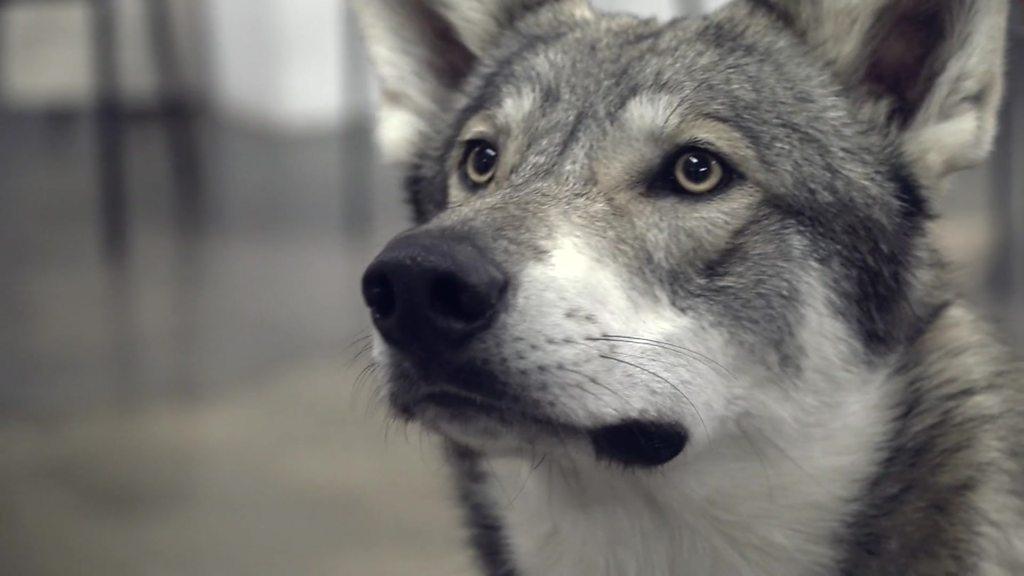Why this woman hates to hear about 'big bad wolf'
- Published
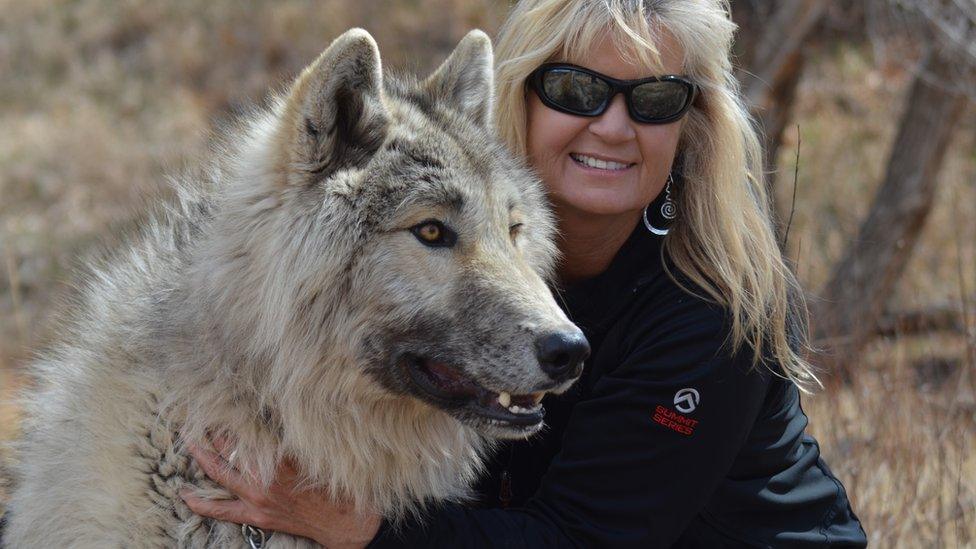
Peggy Jehly has been working with wolves and wolf dogs for a number of years
In Colorado, there is a debate going on about whether wolves should be reintroduced into the wild. As that rumbles on, some are trying to de-stigmatise the creatures through unusual means.
If you go for a hike in the Garden of Gods in Colorado Springs, you might just stumble across a canine on a leash leading a pack of humans on a well-trodden trail. It's normally the other way around but with an apex predator like this you soon realise who is in control.
These magnificent beasts are often stopped by hikers and others, who with jaws open, ask "Are they real?".
And each time, Peggy Jehly, the mother of each of the pack members out stretching their legs on their daily walk, replies: "Yes, they are. But let's be clear - they are high-content wolf dogs."
The Californian set up a business eight years ago giving people the opportunity to walk with her animals - all more lupine than canine - in a bid to educate the public about the importance of wolves to the world.
Her creatures are also used as wolf ambassadors, going out to schools and events in a bid to help remove the stigma of "the big bad wolf"; a reputation enhanced by villainous portrayals of the beasts in fairy tales such as Little Red Riding Hood and The Three Little Pigs.
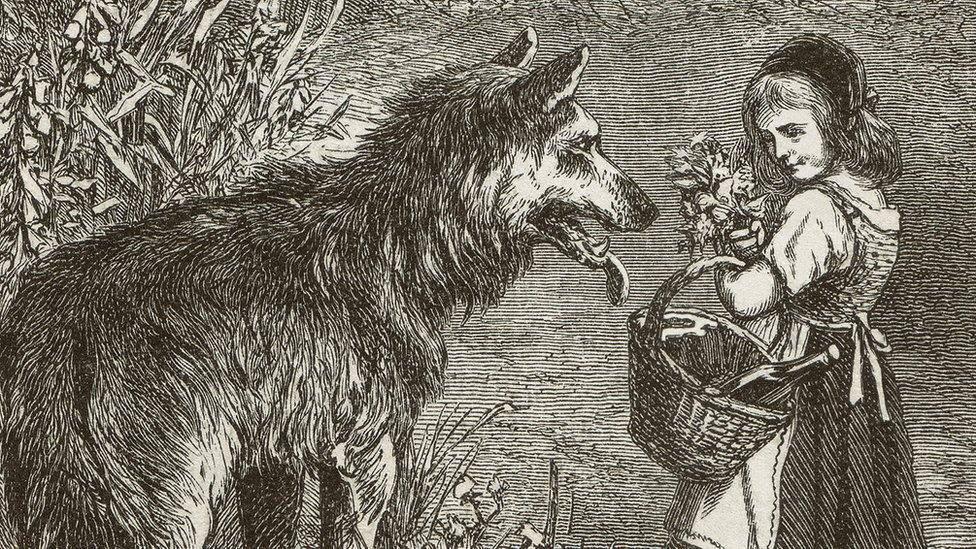
Wolves have retained a bad reputation from tales like Little Red Riding Hood
Jehly says: "I want to dispel the myth that these are bad guys".
Jehly doesn't advertise heavily, instead relying often on people stumbling across Colorado Wolf Adventures through word-of-mouth recommendations. She says this is a deliberate strategy as her priority is the welfare of the wolf dogs.
The walks are incredibly intimate with groups ranging from solo travellers to just five people heading out each time with the creatures, Jehly and a small troupe of volunteer handlers.
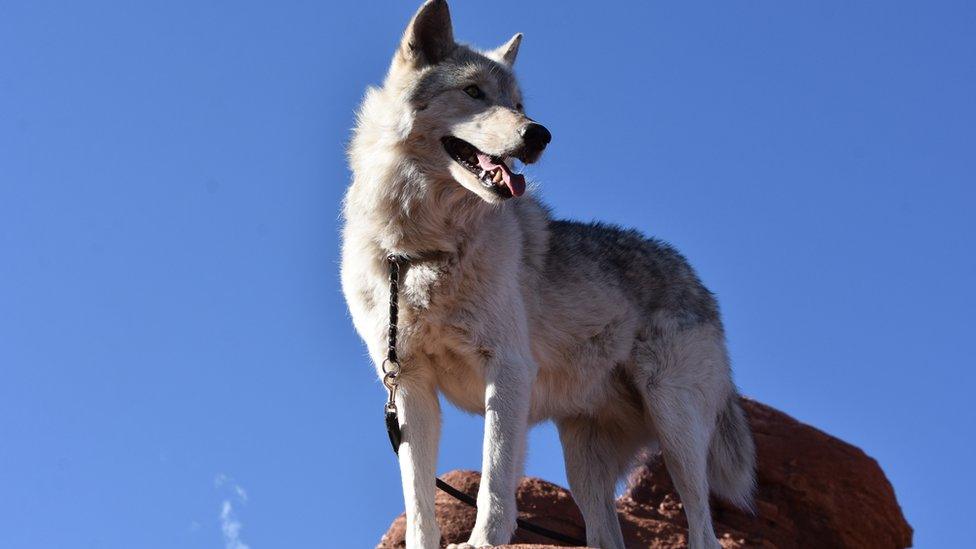
Ghost, who was named after one of the direwolves in Game of Thrones, was a rescue when Peggy first got hold of him
As she takes pictures to capture the memory of the unique experience, every so often she stops and warns the walkers to stay back. Anytime a dog is near, the near-lupines we are accompanying are led to an off-trail patch. This is so everybody in the vicinity, including the wolf dogs, stays safe.
On the walk we took part in, we were led by three-year-old Spirit, believed to be 96-97% wolf who may have looked very dog-like but was an inquisitive creature with a love of howling and a tactile soul.
He's also prone to kissing with full on tongue when he likes the look of someone. A strange experience? Yes. But also an amazing one. Don't forget, it would be pretty much impossible to walk a 100% wolf on a leash, let alone kiss one.
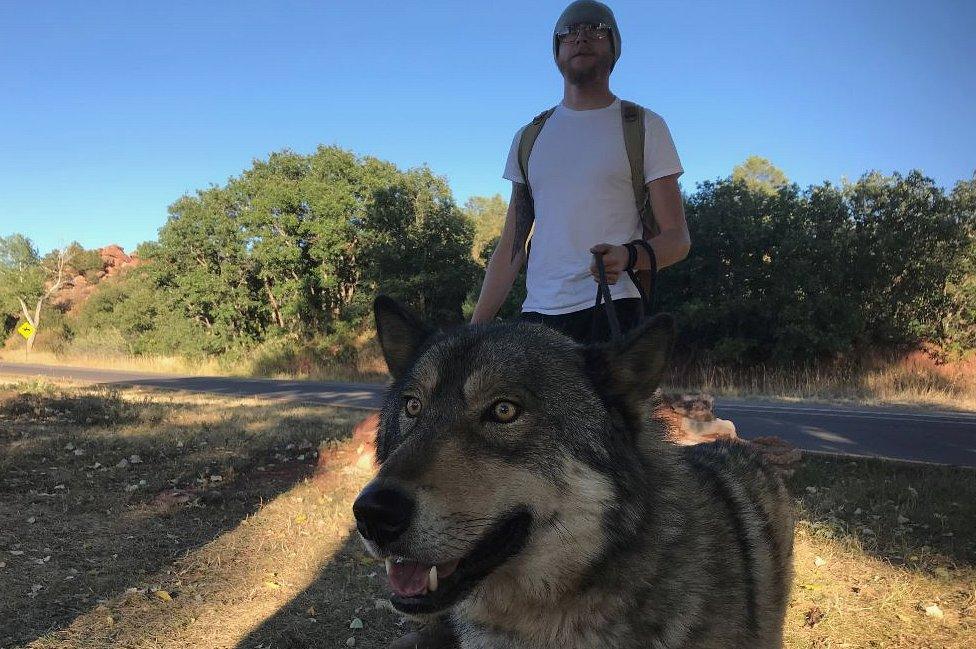
Jayden Williams walking Spirit

We were also joined by Ghost - a beautiful rescue Jehly had picked up in Colorado Springs after his owner gave him up. The seven-year-old Timber Wolf mix is a regal character who refused to pose for pictures on occasion despite the ideal surroundings. It was clear who was in charge of deciding what images were Instagram friendly.
Jayden Williams, 25, from Denver couldn't stop beaming as he walked the two canines. He said: "I had such an awakening experience with the wolves.
"It was incredible to see these creatures with wolf blood running through them respond to our own feelings of awe. They also didn't hesitate to convey their emotions to us - you knew when they decided to take a break or wanted a moment.
"Walking with them made me realise exactly how social wolves are and it was amazing to see how they bond and form relationships."
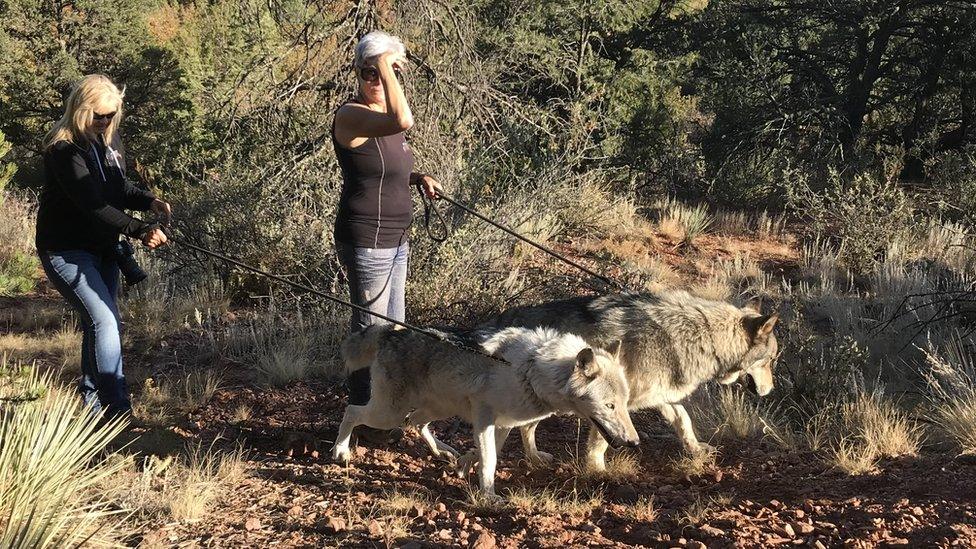
Peggy will not reveal where her pack is housed as she says that is their sanctuary for them to rest in
And while there are wolf and wolf dog sanctuaries across the US which offer visitors an opportunity to enter and meet the creatures, Jehly's business is different as she keeps the home where the wolf dogs stay a sanctuary, not open to the public. Unless you are a volunteer, the only way to interact with her pack is to go on a walk.
Jehly says: "I love to walk and exercise and I didn't want them to be in their enclosures all day. I thought these 'wolf walks' would be a good way to educate the public and do something the animal quite likes at the same time."
But just how can someone get into a job like this?
It's not a role anybody can just pick up and do. Jehly is licensed and has many years of experience dealing with wolves and wolf dogs. She spent many years working at a wolf sanctuary in Colorado, moving up the ranks from volunteer to employee to vice president before she eventually decided to break off and start her own business with the motley pack she had collected.
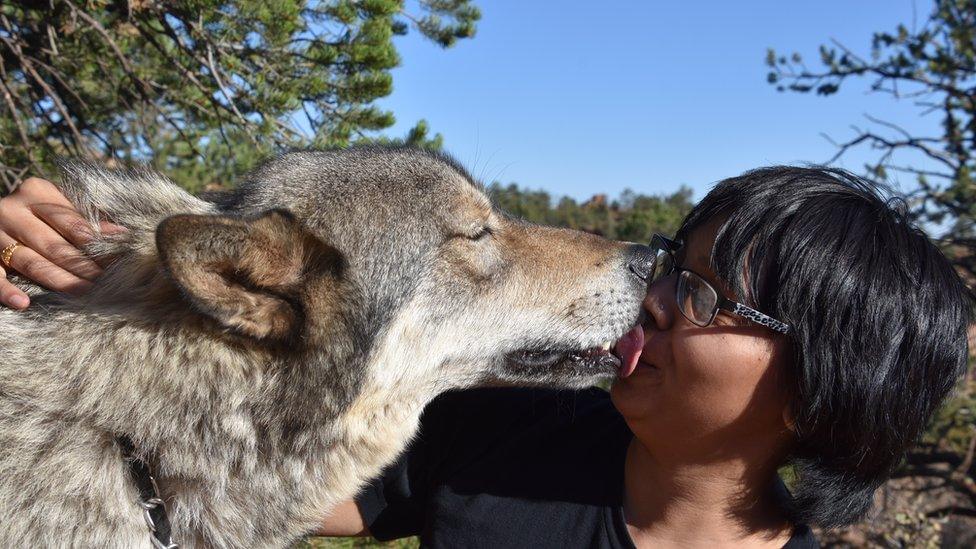
Spirit sometimes offers a kiss as part of the interactions with the public
"When I lived in San Francisco, I was misdiagnosed with primary pulmonary hypertension - a disease that was supposed to kill me. I had to deal with that for six months.
"I looked at life a lot differently. I had always liked the mountains and I found a place that I liked. There was a wolf sanctuary and I told my husband we're going to live there and I'm going to work with wolves. I volunteered and it all started from there."
But while these hybrids may look majestic, they are not the sort of creatures that can be kept easily. They require a lot of energy and in some states in the US, special permits are required along with lip tattoos, while in other states they are illegal.
Jehly says that there had been a rise in people wanting wolf dogs after seeing them in films or in shows such as Game of Thrones but that meant more ended up in sanctuaries as people just couldn't look after them.
Jehly also runs her walks in a state where the issue of wolves is a contentious one. She is a supporter of the Rocky Mountain Wolf Project - a coalition seeking for the reintroduction of wolves in the wild. It is seeking support for a ballot to be put forward for Colorado voters to decide on whether wolves should be reintroduced to the wild in the region.
However, not everyone loves wolves. The opposing Colorado Stop the Wolf coalition believes it would be too risky to return wolves to the state and is lobbying hard to prevent any moves which could lead to this. They say their fear is based on the risk they pose to households pets and livestock.
Denny Behrens, who is the co-chair of the Stop the Wolf Coalition says that the state's parks and wildlife had already investigated the issue in 2005, external. He said that wolves were already migrating into Colorado and while there was nothing to be done to stop that, reintroducing them was a different matter.
"Nobody hates the wolf but it's not fair to take them from Canada and Alaska where they can roam free and they don't have conflict with people.
"We don't have the landscape for the wolf here - there is just no room."
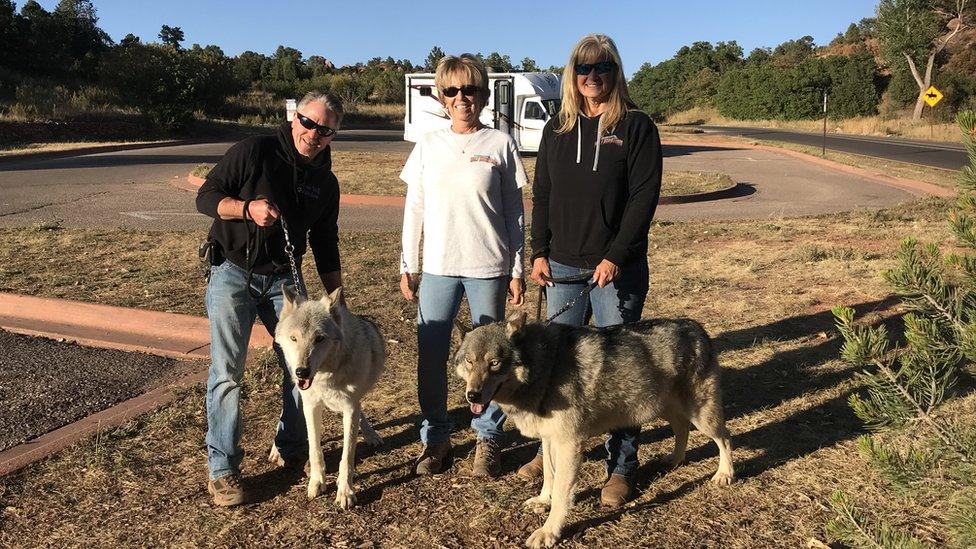
Peggy has a team of volunteers who help her
But for Jehly right now, her main priority is keeping her animals happy and healthy.
She warns it's expensive to keep wolf hybrids and people need to be aware of that before they invest. She has teamed up with a food bank in the area which donates any leftovers that aren't fit for human consumption. The family also has to factor in security and ensure they have fencing in place that's high and safe.
Jehly says: "We always say when people start treating these guys like a dog, they'll remind you that they are a wolf.
"They are pack animals so if you get one and think it'll stay in your house, that's a big mistake."

You may also like:
James Bond the wolf dog is a natural poser for aspiring artists
- Published4 November 2018
